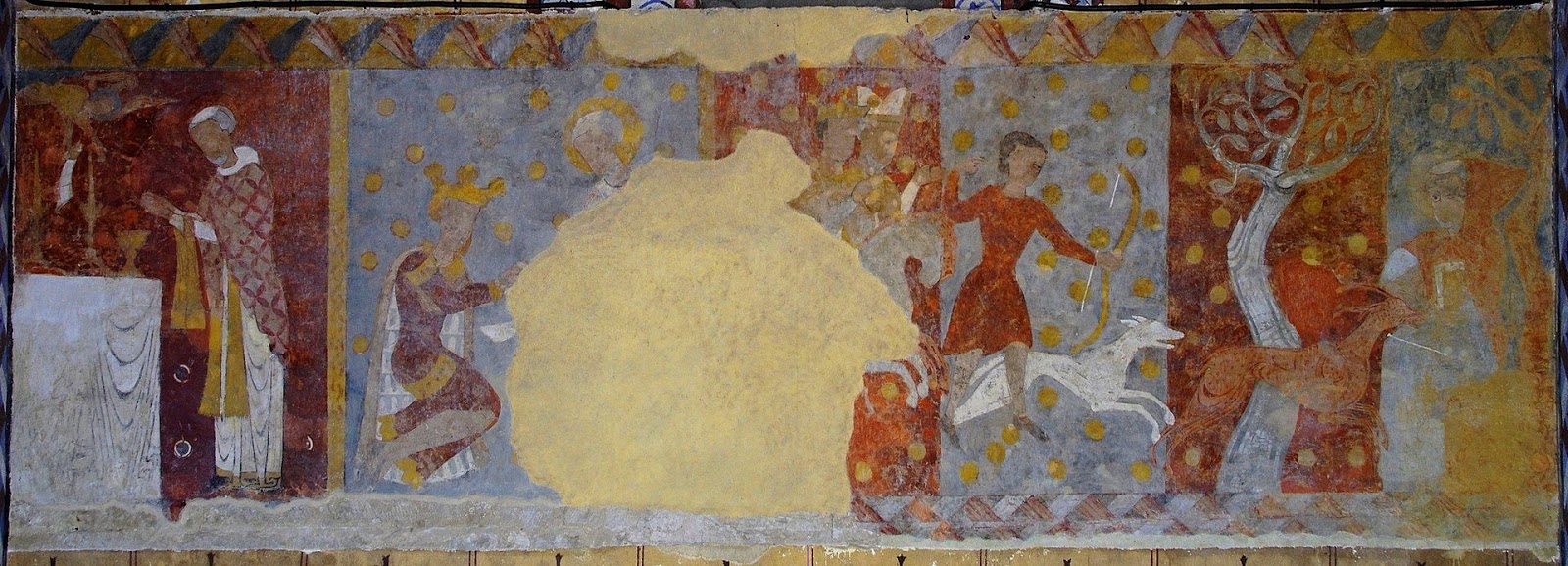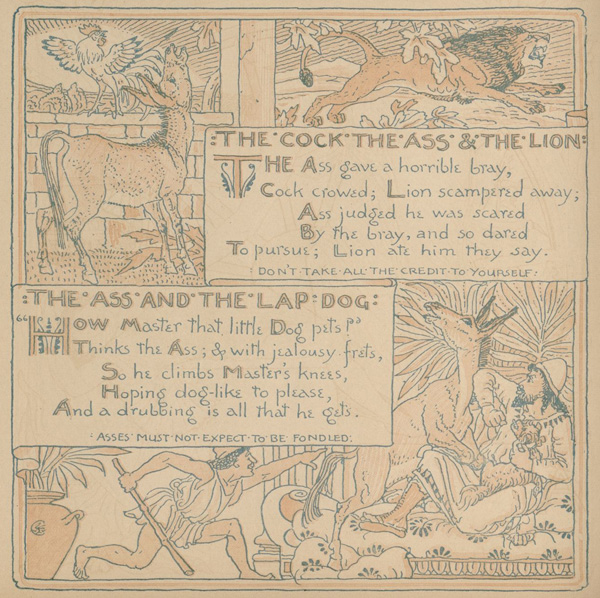The Ballad of Saint Giles and the Deer
All in the forest far away
Where no one ever came,
There dwelt a good man, old and gray,—
Saint Giles the hermit's name.
His forest home a rocky cave
Beneath an aspen tree;
And for his friend Saint Giles did have
A Deer, who wandered free.
A gentle red and mottled Deer
Who made her home close by.
Who at his call came without fear.
Forgetting to be shy.
Sure never all in lovely France
Was there a Deer so tame;
Ah, but to see her start and prance
When he would call her name!
She gave him milk, his simple fare,
And browsed upon the green,
Ah, such a gentle, loving pair
I wis was never seen.
And he was happy in his cell,
And joyous 'neath his trees,
Content with woodland beasts to dwell,
His only neighbors these.
The wood was dark, the wood was grim,
And never till one day
Had human voices troubled him,
Or world-folk passed that way.
But on a dewy springtime morn
When April climbed the hill,
There came the wind of silver horn,
Halloos and whistles shrill;
The galloping of horses' feet,
The bloody bay of hounds,
Broke through the forest silence sweet
Saint Giles sat in his lonely cell,
Whenas the rout drew nigh;
But at the noise his kind heart fell
And sorrow dimmed his eye.
He loved not men who hunt to kill,
Loved not the rich and grand,
For in those days the Pagans still
Held lordship in the land.
But scarcely had he reached the door
And seized his staff of oak,
When like a billow with a roar
The chase upon him broke.
With one last hope of dear escape,
Into the open space
Bounded a light and graceful shape,
The quarry of the chase.
All flecked with foam, all quivering
With weariness and fear,
Crouched at his feet the hunted thing,
His gentle friend, the Deer.
Behind her bayed the pack of hounds,
Their cruel teeth gleamed white,
Nearing with eager leaps and bounds;
He turned sick at the sight.
Saint Giles looked down upon the Deer.
Saint Giles looked up again,
He saw the danger drawing near,
The death, with all its pain.
He laid his hand upon her head,
The soft head of his friend,—
"And shall I let thee die?" he said,
"And watch thy hapless end?"
He stooped and gently murmured, "Nay!"
Stroking her mottled side,
He stepped before her where she lay;
"They slay me first!" he cried.
Her frightened eyes looked up at him,
Her little heart beat high,
She trembled sore in every limb,—
The bushes parted nigh.
"Halloo! Halloo!" the huntsmen cried
As through the hedge they burst;
An archer all in green espied
The crouching quarry first.
Swift as a thought his arrow flew,
Saint Giles threw out his arm,
Alack! the aim was all to true,
Saint Giles must bear the harm.
The arrow pierced too well, too well;
All in that mournful wood
Saint Giles upon the greensward fell,
And dyed it with his blood.
He fell, but falling laid his hand
Upon the trembling Deer,—
"My life for hers, dost understand?"
He cried so all could hear.
Now as upon the green he lay
All in a deathly swound,
The King dashed up with courtiers gay
And looked upon his wound;
The King rode up, and "Ho!" he cried,
"Whom find we in our wood?
Who spares the deer with mottled hide?
Who sheds an old man's blood?"
The King looked down with ruthful eye
When all the thing was told,
"Alack!" he cried, "he must not die,
So kind a man and bold.
"Bear me the Saint into his cave;
Who falls to save his friend
Deserves for leech his King to have;
I will his pallet tend."
They spared to him the sore-bought Deer;
And in that lowly cell
For many weary days and drear
The King came there to dwell.
The King, who was a godless man,
A pagan, heart and soul,
Played nurse until the wound began
To heal, and Giles was whole.
But in the little forest cave
The King learned many things
Known to the meanest Christian slave,
But secrets from the kings.
For good Saint Giles had won his heart
By his brave deed and bold,
And ere the great King did depart
His Christian faith he told.
And while the red Deer stood beside,
The King gave Giles his word
That e'er a Christian he would bide,
And keep what he had heard.
And so the monarch rode away
And left the two alone,
Saint Giles a happy man that day,
The good Deer still his own.
Safe from the eager hunting horde
The Saint would keep his friend,
Protected by the King's own word
Thenceforth unto the end.
For unmolested in his cell,
Careless of everything
Giles with his friendly Deer could dwell
(800 words)

























